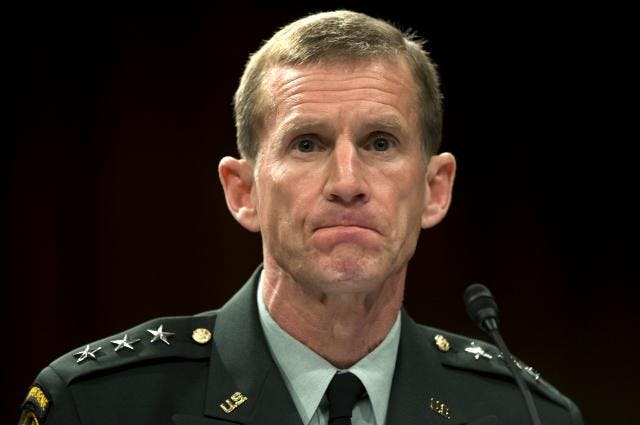If you are Army General Stanley McChrystal, the now former commander of U.S. forces in Afghanistan, you may ask yourself this at some point today: why didn’t I spend a few minutes talking to my top HR person before opening my big mouth?
McChrystal was relieved of his command – yes, he was fired – on Wednesday by President Obama for disparaging comments he made that were published in Rolling Stone magazine.
“The article quoted General McChrystal and his aides speaking critically of nearly every member of the president’s national security team, “ The New York Times said , “dismissing Vice President (Joe) Biden as “Bite Me”; calling the national security adviser, Gen. James Jones, a “clown”; and disparaging other top officials.”
“I welcome debate among my team,” the president said about the decision to replace McChrystal, “but I won’t tolerate division.
It’s easy to categorize Gen. McChrystal’s remarks as part of the natural (and some say growing) tensions that exist between our civilian leaders and the professional military officers who report to them, but there’s more to it than that. How does someone as accomplished as Gen. McChrystal, a career military man who had reached top ranks of his profession, a leader of the first order, have a brain meltdown and say all sorts of inappropriate things to a publication like Rolling Stone?
Badmouthing rarely pays off
Here’s one thing that’s clear: it rarely pays for a high-profile person to speak their mind in public. Unless you are a late night talk show host like David Letterman or Conan O’Brien, badmouthing people around or above you rarely turns out well.
Yes, speaking your mind may feel good, but it usually turns out bad.
I’m surprised that someone like Gen. McChrystal didn’t know that, because high ranking military officers rarely become high ranking officers unless they have mastered the art of speaking in public without saying anything controversial. In fact, McChrystal’s big mistake was that he probably didn’t spend much time getting counsel and guidance from the OTHER person in his organization who has undoubtedly mastered that same kind of skill set – his HR chief.
HR leaders, like high-ranking generals, don’t get very far without learning how to avoid publicly stepping on their tongue. McChrystal’s mistake was forgetting that – and not reaching out to the one person who could have reminded him.
Like high-ranking generals, human resources leaders – whether you call them HR Director, Vice President for HR, or even Chief People Officer – have to master the art of keeping proprietary, personal and financial information secret, yet still must be able to offer strategic counsel and make decisions based on all that secret information without revealing too many specifics. In fact, HR leaders are probably most valuable to the rest of their organization’s executive team when they can effectively serve as a trusted counselor and adviser to the rest of the team.
HR knows: it’s about discretion and judgment
Where HR leaders really earn their stripes, however, is in the area of discretion and good judgment. Great HR leaders (and I have worked for both really strong ones and as well as some really poor ones) are at their best when people in all parts of an organization feel they can be open and honest with them. The top-notch HR leader can then take that information and, using smart and sensible judgment, parcel it out to the executive team discreetly, as needed. They can be both an advocate for the worker as well as counselor to the executives. It’s a high-wire walk, to be sure, but the best HR leaders do it with the grace and skill of a Flying Waldenda.
This is where Gen. McChrystal went wrong. President Obama said the general exercised “poor judgment” as he disparaged the military’s civilian leadership, and that’s probably one of the worst sins a senior military officer can ever make. McChrystal wasn’t the first general to do that, of course, nor will he be the last – but he is the latest in a line of generals who got canned for doing so by the president .
As Republican Sen. Lindsey Graham of South Carolina, a colonel in the Air Force Reserve who served on active duty in Afghanistan, put it: “I’ve been a military officer most of my adult life, and there’s lines you can’t cross. Those lines were crossed. It was poor judgment, but it was beyond poor judgment. It made it virtually impossible for the general to stay in his job.”
Yes, bad judgment will do that too you. And as HR leaders know all too well, losing the faith others have in your judgment when your job is all about judgment is, well, a bridge too far for McChrystal to come back from . He might have remembered that had he talked to his HR chief before he got himself featured on the cover of the Rolling Stone.
